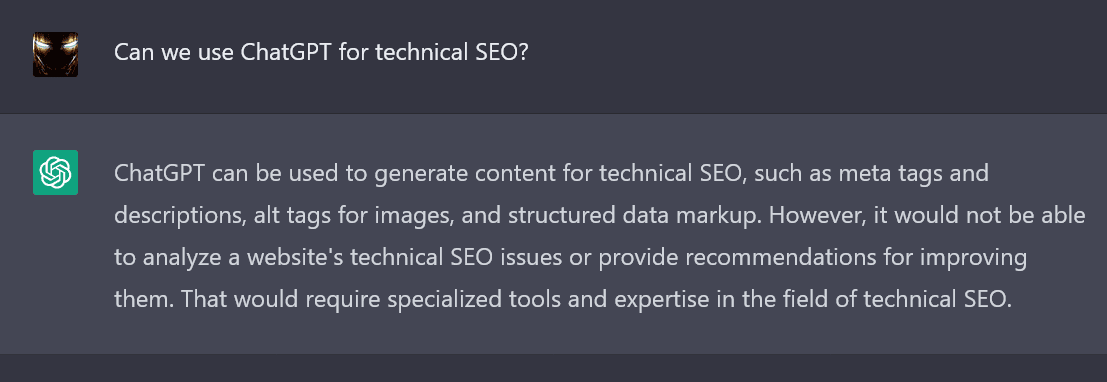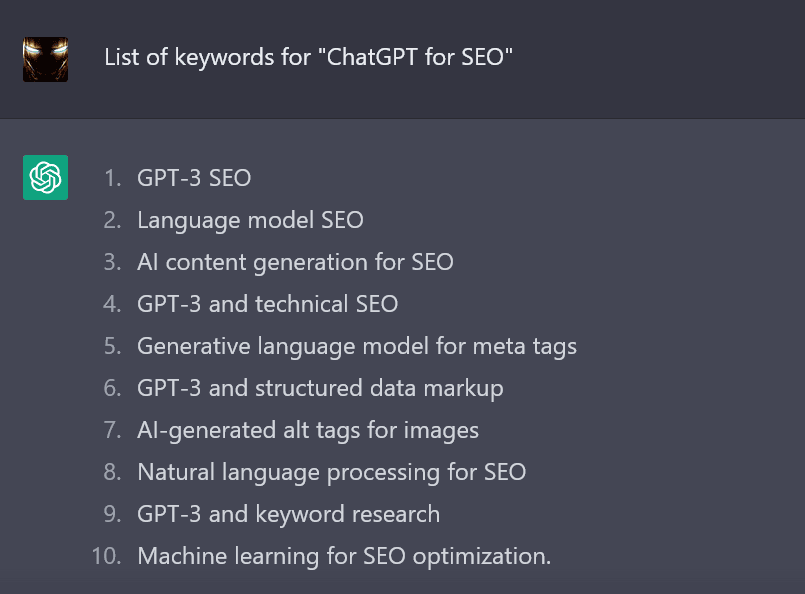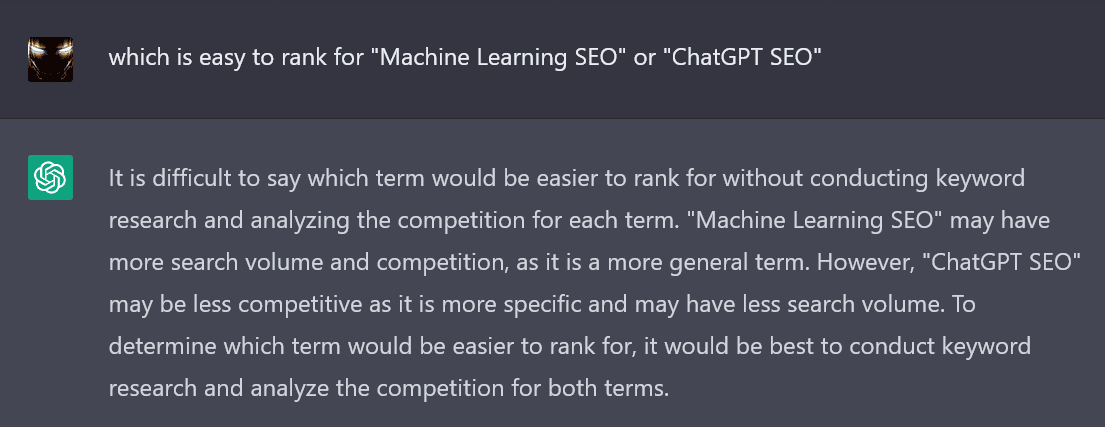Last Updated on February 7, 2023
Ever since OpenAI released its new AI project, ChatGPT, the internet and social media have been flooded with posts on how incredible technology is.
In its simplest form, ChatGPT is a new generative language model optimized for chats.
The power of AI in content generation has been a matter of discussion for a long time, but ChatGPT has shown the capability of generative AI for SEO. We won’t go into the engineering and technological aspects of ChatGPT but focus this article more on how this text-generating AI application can be used for your search engine optimization campaigns.

What is ChatGPT?
ChatGPT is a generative language model optimized for the conversational chat based on OpenAI’s GPT-3 technology. The incredible capabilities of this chatbot are because of GPT-3, or the third-generation Generative Pre-trained Transformer. It is a neural network machine learning model with over 175 billion parameters and is trained to generate any type of text based on internet data.
To give you an idea of the size of GPT-3’s deep learning neural network, before its availability, Microsoft’s Turing NLG model was the largest natural language processing model, which had only 10 billion parameters. Today, GPT-3 is the largest neutral network ever produced, which is why it is much better at generating text like a human.
Think of ChatGPT as a chatbot on steroids.
It’s not only able to create content but also write code, generate poems, and answer difficult mathematical questions.
We asked ChatGPT, Can we use ChatGPT for technical SEO?
The reply was aptly put:
ChatGPT can be used to generate content for technical SEO, such as meta tags and descriptions, alt tags for images, and structured data markup. However, it would not be able to analyze a website’s technical SEO issues or provide recommendations for improving them. That would require specialized tools and expertise in the field of technical SEO.

ChatGPT is specifically designed to reply in a conversational context unlike other language models. This is why it can generate more natural and varied text than machine-generated text.
Let’s dive deeper into how we can use ChatGPT for SEO as a productivity tool.
Content creation but now how you think
One of the biggest challenges for marketers is to create content, particularly if they don’t have skilled writers in their teams.
ChatGPT can generate text for you on virtually any topic, but is it advisable?
We would not recommend using ChatGPT for writing web pages and blog posts. In 2022, John Mueller, the Google Search Advocate, stated that there is no doubt that the search engine views AI-generated content to be spam and is a violation of the company’s guidelines. It is safe to assume that Google algorithms can identify content generated by ChatGPT even if it uses anti-detection algorithms. This is why you must always include human oversight when creating content with AI tools.
That being said, you can use ChatGPT freely to create content for social media posts, landing page copy for PPC, and email pitches. It can also be a great brainstorming tool for content ideas.
In short, you can streamline redundant SEO content tasks like ad variations and social media posts using ChatGPT. Just make sure to proofread for any inaccuracies.
Keyword research
ChatGPT-generated text risks getting penalized, but it must not stop you from using it for keyword research and analysis. With ChatGPT, keyword research becomes practically effortless. For instance, we researched keyword ideas for this post using ChatGPT.
Here is the result:

All you have to do for content research and analysis is open ChatGPT and type in a few target keywords or the topic. It will generate a list of keywords by analyzing the search results based on your input.
We did the same in the example above. After we entered the query, ChatGPT presented a list of keywords and phrases that can come up for the topic.
Not only simple keyword research, but you can use the application for determining the competition of various keywords. We asked, which is easy to rank for, “Machine Learning SEO” or “ChatGPT SEO”?
Here’s the output:

It entirely depends on your ability to use ChatGPT for keyword research and analysis.
Better understanding of search intent
Arguably, the potential of understanding the search intent of SEO-related topics with ChatGPT is exceptionally high. This generative language model can comprehensively explore any search query beyond simple keyword match into the user’s intent.
This is almost similar to what Google does with your search queries. With time, the Surgeon General algorithms have improved astonishingly well to understand the intent behind every input. But in the words of Keiran Flanagan, “Google takes your query and attempts to answer it. ChatGPT takes your query and will often improve upon it.”
4/ Added Value:
In a bunch of examples, ChatGPT provides additional tips the searcher hadn't considered
Google takes your query and attempts to answer it
ChatGPT takes your query and will often improve upon it
Great example from awesome study ran by @HelloSurgeAI pic.twitter.com/ZeDJGWP2VR
— Kieran Flanagan 🤘 (@searchbrat) January 3, 2023
ChatGPT is still in its experimental phase, but it seems that its learning capability is exponentially higher than other machine learning models. You can utilize the tool to better understand the search intent of the queries. As it improves on the input, it can help you understand the information that even searchers don’t know they’re looking for. As a marketer, you must all be aware of how important it is to better frame your content in the context of answering questions to improve the rankings.
Managing analytics reports
As a digital marketer, you must manage analytics reports to share with your clients as proof of your efforts and results. Interestingly, this is another domain where ChatGPT can be of incredible help.
You must be working with MS Excel or other reporting tools that require knowledge of regular expressions. Suppose you don’t have a strong programming background, then you can use ChatGPT for composing and managing analytics reports. For instance, you may want to filter a report for particular words and phrases that you can use for creating FAQs. You can use ChatGPT, even with basic knowledge of regular expressions, to generate a list automatically that you can use with MS Excel or Google Sheets.
ChatGPT technically eliminates the requirement to learn formulas to parse data in reports. The complete guide on the topic is out of the scope of this post, but there are several resources on the internet that you can explore to learn how to use ChatGPT for managing analytics reports.
AI-powered SEO tools are the future
There is no debate that ChatGPT is an incredibly impressive tool that truly represents the capability of artificial intelligence for content generation.
For SEO, ChatGPT has several applications beyond just content generation. What we have shared above is just the tip of the iceberg, but if you learn to fully utilize its capabilities, you can save hundreds of hours yearly.
However, it’s essential to be aware of the limitation of ChatGPT. The application is not updated with recent events and depends on data created till 2021. Simply put, you cannot use ChatGPT to get information on current events. It is also not allowed to provide content on several topics such as sex, racism, and potentially harmful topics such as how to create an explosive.
Conclusion
ChatGPT is worth the hype, but as an SEO service provider, you must use it carefully. The content it generates is still AI-generated, meaning it can be penalized by Google. The best use of ChatGPT is for content ideas, keyword research, content generation for ads, emails, and social media posts, and report generation.
Let us know what you think about the potential application of ChatGPT for SEO in the comments below.
